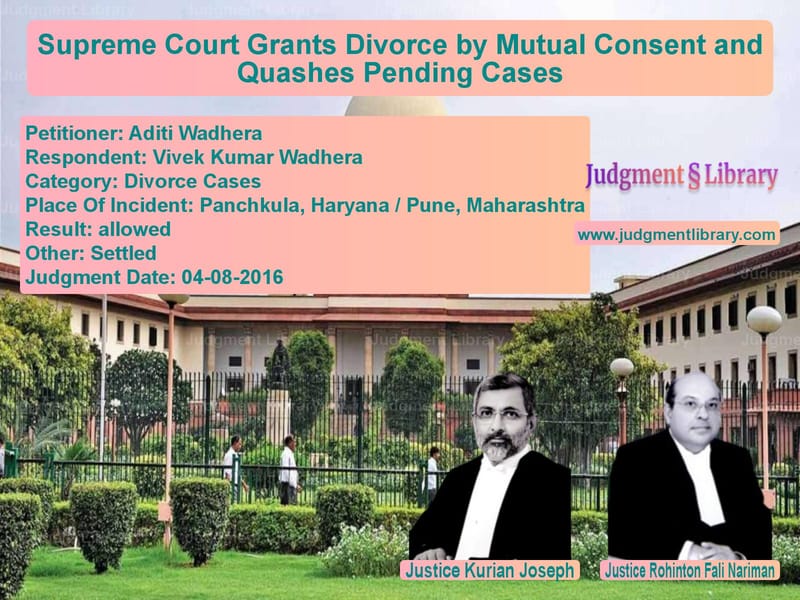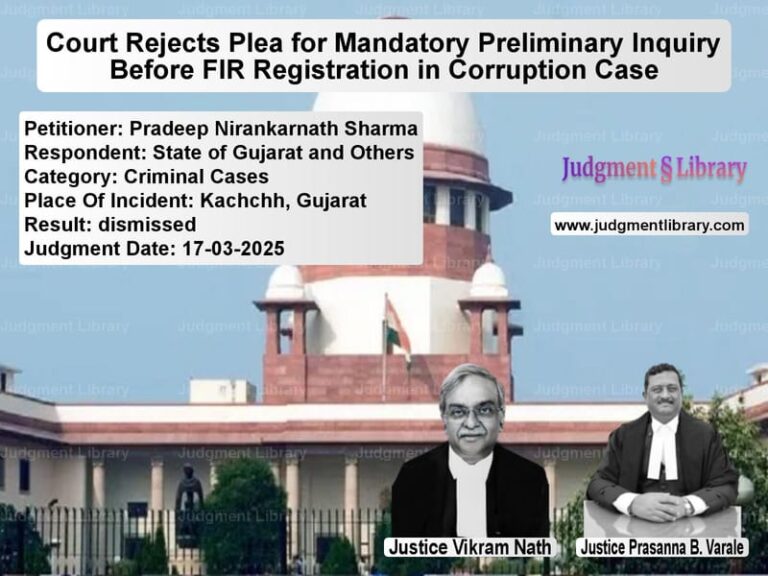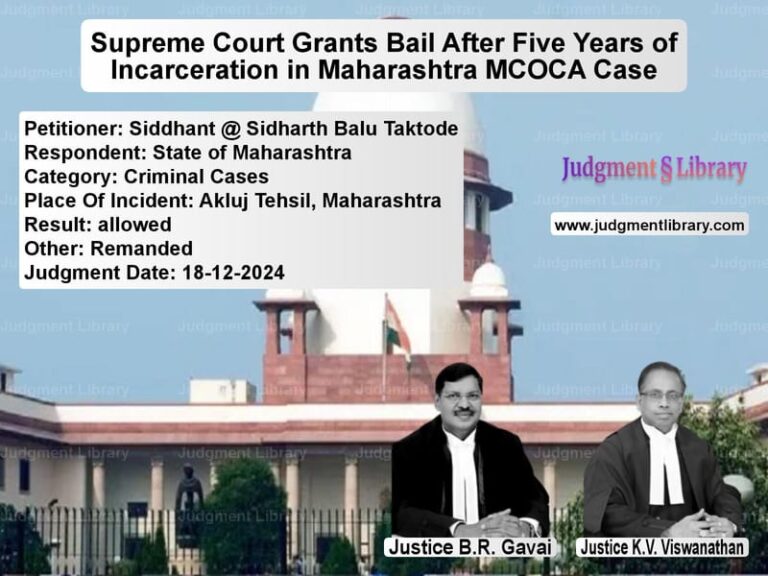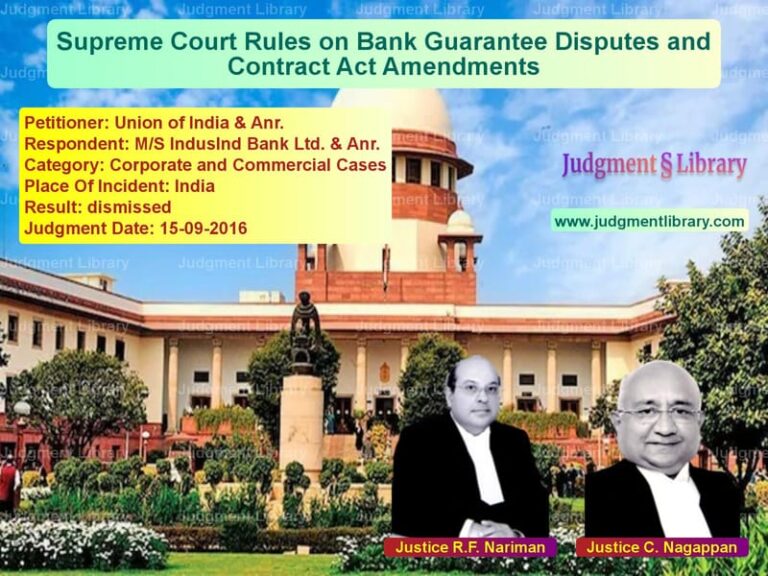Supreme Court Grants Divorce by Mutual Consent and Quashes Pending Cases
The case of Aditi Wadhera v. Vivek Kumar Wadhera involved a transfer petition related to a divorce case filed under Section 13B of the Hindu Marriage Act, 1955. The Supreme Court, in its judgment dated August 4, 2016, dissolved the marriage by mutual consent under Article 142 of the Constitution, waiving the statutory waiting period. Additionally, it quashed all pending criminal cases between the parties.
Background of the Case
The petitioner, Aditi Wadhera, had approached the Supreme Court through Transfer Petition (C) No. 569 of 2014, seeking the transfer of Suit No. HMA 32/2013, titled Vivek Kumar Varinder Wadhera v. Aditi Vivek Kumar Wadhera, from the District & Sessions Court, Panchkula, Haryana, to the Family Court, Pune, Maharashtra. During the pendency of proceedings, the parties were referred to mediation, where they reached an amicable settlement.
Legal Issues
- Whether the Supreme Court could waive the statutory waiting period under Section 13B of the Hindu Marriage Act.
- Whether all pending criminal cases between the parties should be quashed in light of the settlement.
- Whether the terms of the settlement should form part of the decree.
Petitioner’s Arguments (Aditi Wadhera)
The petitioner argued:
- The case should be transferred from Panchkula to Pune for convenience.
- The marriage had irretrievably broken down, and both parties had agreed to mutual divorce.
- Since all disputes were settled, criminal cases should be quashed.
- The statutory waiting period under Section 13B(2) should be waived in the interest of justice.
Respondent’s Arguments (Vivek Kumar Wadhera)
The respondent countered:
- He agreed to a mutual divorce and the settlement terms.
- He had to return to his workplace in the U.S.A., and further delays would be prejudicial.
- Since the settlement was final, quashing criminal cases was necessary to ensure a complete resolution.
Supreme Court’s Observations and Ruling
1. Divorce Granted by Mutual Consent
The Court, invoking Article 142, waived the statutory waiting period:
“We are of the view that it is a fit case to invoke our jurisdiction under Article 142 of the Constitution of India and grant a decree of divorce by mutual consent by waiving the statutory period of waiting.”
Thus, the marriage between Aditi Wadhera and Vivek Kumar Wadhera was dissolved with immediate effect.
2. Criminal Cases Quashed
The Court quashed all pending criminal cases, ensuring a clean break for both parties:
“Since the parties have settled their disputes amicably, we are of the view that the interest of justice would be met, in case, the whole disputes are also finally settled.”
The following cases were quashed:
- RCC No. 2498 of 2011 (State of Maharashtra v. Vivek Kumar Varinder Wadhera & Others).
- RCC No. 5144 of 2013 (Aditi Vivek Wadhera v. Vivek Kumar Wadhera & Ramesh Grover).
- Criminal Miscellaneous Application No. 1068 of 2011 (Aditi Vivek Wadhera v. Vivek Kumar Wadhera & Others).
- Criminal Revision Nos. 134, 73, and 51 of 2015.
- Criminal Appeal No. 21 of 2012.
3. Settlement Terms Made Part of the Decree
The Supreme Court incorporated the settlement into the final decree:
“The terms of settlement dated 13.6.2015 will form part of the decree.”
This ensured that both parties were legally bound by their agreed terms.
4. No Travel Restrictions
The Court also clarified that there were no travel restrictions on either party:
“We make it clear that there shall not be any restraint on the travel of both the parties and their family members on account of criminal cases referred to above, since we have quashed the same.”
Final Verdict
The Supreme Court ruled:
- The marriage was dissolved by mutual consent under Section 13B of the Hindu Marriage Act.
- The statutory waiting period was waived under Article 142.
- All pending criminal cases were quashed.
- The settlement agreement was made part of the decree.
- No travel restrictions were imposed on either party.
Key Takeaways
- The Supreme Court can waive the statutory waiting period for mutual divorce under Article 142.
- Mutual settlements can lead to the quashing of criminal cases.
- Courts favor amicable resolutions and finality in matrimonial disputes.
- Travel restrictions due to pending criminal cases can be lifted upon settlement.
Impact of the Judgment
This ruling has significant implications for matrimonial law:
- It streamlines the divorce process when both parties agree.
- It ensures that settlements are respected and enforced.
- It prevents prolonged litigation and allows parties to move forward.
In conclusion, the Supreme Court’s decision in Aditi Wadhera v. Vivek Kumar Wadhera establishes a precedent for efficient and fair resolution of divorce and related disputes.
Don’t miss out on the full details! Download the complete judgment in PDF format below and gain valuable insights instantly!
Download Judgment: Aditi Wadhera vs Vivek Kumar Wadhera Supreme Court of India Judgment Dated 04-08-2016-1741878499513.pdf
Direct Downlaod Judgment: Direct downlaod this Judgment
See all petitions in Mutual Consent Divorce
See all petitions in Alimony and Maintenance
See all petitions in Judgment by Kurian Joseph
See all petitions in Judgment by Rohinton Fali Nariman
See all petitions in allowed
See all petitions in settled
See all petitions in supreme court of India judgments August 2016
See all petitions in 2016 judgments
See all posts in Divorce Cases Category
See all allowed petitions in Divorce Cases Category
See all Dismissed petitions in Divorce Cases Category
See all partially allowed petitions in Divorce Cases Category







